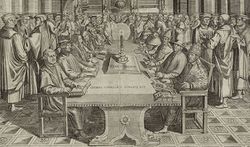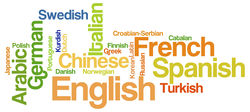Category:Early Islamic Studies--1500s
|
|
Early Islamic Studies : 2020s -- 2010s -- 2000s --1990s -- 1980s -- 1970s -- 1960s -- 1950s -- 1940s -- 1930s -- 1920s -- 1910s -- 1900s -- 1850s -- 1800s -- 1700s -- 1600s -- 1500s -- 1450s -- Home Timeline : 2020s -- 2010s -- 2000s -- 1990s -- 1980s -- 1970s -- 1960s -- 1950s -- 1940s -- 1930s -- 1920s -- 1910s -- 1900s -- 1850s -- 1800s -- 1700s -- 1600s -- 1500s -- 1450s -- Medieval -- Home
|
History of Research (1500s) -- Notes
At the beginning of the 16th century, following the path of Nicolaus Cusanus and Giovanni Pico della Mirandola, Guillaume Postel also advocated a conciliatory approach to the Qur'an based on the assumption that all religions shared common roots and principles.
However, when In 1543 Theodor Bibliander published the first printed edition of the Qur'an in Latin, based on the 12th cent. translation by Robert of Ketton (Lex Mahumet pseudoprophete), the text was introduced to the readers in the context of a series of Christian apologetic treatises and commentaries.
In 1547 the Florentine Andrea Arrivabene was the first to publish a translation of the Koran into a modern European language, based on the Latin translation of Robert of Ketton.
Pages in category "Early Islamic Studies--1500s"
The following 7 pages are in this category, out of 7 total.
1
- (++) Machumetis, Saracenorvm principis, eiusque successorum vitae, ac doctrina, ipseque Alcoran (1543 Bibliander), book (ed. princeps)
- Alcorani seu legis Mahometi et Evangelistarum concordiae liber (1543 Postel), book
- De orbis terrae concordia (The Harmony of the Earth / 1544 Postel), book
- (+) L'Alcorano di Maometto (The Alquran of Muhammad / 1547 Arrivabene), book
- Apophthegmata Ebraeorum ac Arabum (1591 Drusius), book




